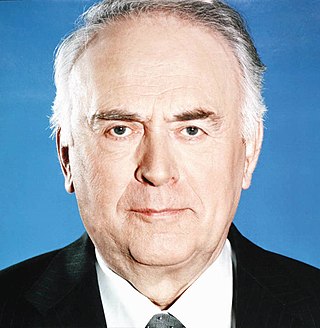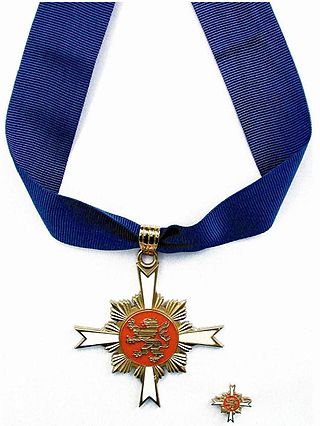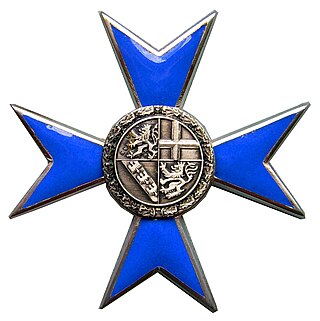
The Order of Merit of the Federal Republic of Germany is the only federal decoration of Germany. It is awarded for special achievements in political, economic, cultural, intellectual or honorary fields. It was created by the first President of the Federal Republic of Germany, Theodor Heuss, on 7 September 1951. Colloquially, the decorations of the different classes of the Order are also known as the Federal Cross of Merit.

Wolfgang Böhmer is a German politician of the Christian Democratic Union (CDU) and was the 5th Minister-President of Saxony-Anhalt from May 2002 to April 2011. He served as President of the Bundesrat in 2002/03. He formerly worked as a medical doctor.

Bärbel Wöckel is a former East German sprinter. She never ran a world record in the individual disciplines. However, she ran several world records as part of relay teams with Doris Maletzki, Renate Stecher and Christina Heinich over 4 x 100 meters, the last time on September 8, 1974, in Rome. At the GDR Championships she took first place in the 4 x 100-meter relay in 1974, 1977, 1978, 1981 to 1984. In 1976 she won third place with the team.

The Bavarian Order of Merit is the Order of Merit of the Free State of Bavaria. It is awarded by the Minister-President of Bavaria as a "recognition of outstanding contributions to the Free State of Bavaria and the Bavarian people".

The Patriotic Order of Merit was a national award granted annually in the German Democratic Republic (GDR). It was founded in 1954 and was awarded to individuals and institutions for outstanding contributions to the state and society in various areas of life.

The Hessian Order of Merit is a civil order of merit, and the highest award of the German State of Hesse. The order was established 1 December 1989.

Order of Merit of Baden-Württemberg is the highest award of the German State of Baden-Württemberg. Established 26 November 1974, it was originally called the Medal of Merit of Baden-Württemberg. Effective 26 June 2009, the medal assumed its current name.

The Order of Merit of Berlin is this highest award of the German State of Berlin. Awarded in the name of the Senate of Berlin, the order had recognized outstanding contributions to the State of Berlin since 21 July 1987. Awarded each year on 1 October, the anniversary of the Berlin Constitution, the order is limited to no more than 400 living recipients. As of 2016 the order had been awarded 431 times, to 152 women and 279 men.

The Order of Merit of Mecklenburg-Vorpommern is a civil order of merit, and the highest award of the German State of Mecklenburg-Vorpommern. The award is presented to men and women for exceptional performance over a long period of time, or an extraordinary individual performance for the benefit of Mecklenburg-Vorpommern. Founded in 2001 and first presented in 2002, the order may be presented to up to 20 persons per year.

The Lower Saxony Order of Merit is a civil order of merit, of the German State of Lower Saxony. The order was established 27 March 1961. The order is presented in three classes, the highest is the Grand Cross of Merit, the next is the Cross of Merit First Class, and the lowest is the Cross of Merit on Ribbon.

The Order of Merit of North Rhine-Westphalia is a civil order of merit, of the German State of North Rhine-Westphalia. The Order of Merit of North Rhine-Westphalia was founded on 11 March 1986. It is awarded to citizens representing all segments of the population who have made extraordinary contributions to the people and state of North Rhine-Westphalia. The order is limited to 2500 living recipients. From its founding through January 2010, a total of 1,559 people have been awarded the Order of Merit of North Rhine-Westphalia.

The Order of Merit of Rhineland-Palatinate is a civil order of merit, of the German State of Rhineland-Palatinate. The order is presented for outstanding service to the state and people of Rhineland-Palatinate. It was founded on 2 October 1981, and first awarded in 1982. The order is limited to 800 living recipients. Through 2012, the order had been awarded 1035 times.

The Saarland Order of Merit is the highest award of the German State of Saarland. Established on 10 December 1974, the order is presented in recognition for outstanding service to Saarland by the Minister-President of Saarland. Awarded in a single class, in the form of an Officer's Cross (Steckkreuz), the insignia of the order is a blue enameled four-armed eight pointed Maltese cross. In the center of the cross is a silver medallion bearing the wreathed Coat of arms of Saarland.

Werner Leich was a German Protestant theologian and pastor. From 1978 to 1992, he was the longest-serving Landesbischof of the Lutheran Church in Thuringia during the era of the German Democratic Republic, and led the state church’s independence from the regime.

The Order of Merit of the Free State of Saxony is a civil order of merit, and the highest award of the German state of Saxony. First presented in 1997, it is awarded by the Minister-President of Saxony. The order is presented to individuals who have made outstanding contributions to the people and state of Saxony. The award is limited to a total of 500 living recipients. As of October 2020, it has been awarded 349 times.

The Order of Merit of Schleswig-Holstein is an award presented by the Minister-President of German state Schleswig-Holstein. Established in 2008, it is the highest award of the state. Prior to 2008, the Schleswig-Holstein-Medaille was the highest award of the state. In the establishing decree of the order it states prior recipients of the medal are members of the order. To preserve the exclusivity of the order it is limited to 500 living recipients.

The Order of Merit of Saxony-Anhalt is the highest award of the German State of Saxony-Anhalt. Established 23 May 2006, the order is presented by the Minister-President of Saxony-Anhalt. The total number of living recipients is limited to 300. Recipients of the order are recognized for exceptional performance over a longer period of time or an extraordinary individual performance for Saxony-Anhalt and its citizens. Individuals are considered from among the citizens and non-citizens of Saxony-Anhalt.

The Military Karl-Friedrich Merit Order was a military order of merit of the Grand Duchy of Baden. Established 5 October 1805 by Charles Frederick, Elector and later Grand Duke of Baden, the order recognized outstanding military merit amongst military officers. In 1807, medals associated with the order were added as the highest awards for bravery for non-commissioned and enlisted soldiers.
The orders, decorations, and medals of the German states, in which each states of Germany has devised a system of orders and awards to honour residents for actions or deeds that benefit their local community or state, are in turn subsumed within the German honours system. Each state sets their own rules and criteria on eligibility and also how each medal is awarded and presented. Most of the orders allow for the recipient to wear their orders in public.

Robert Yehoshua Büchler was a Slovak-Israeli historian. In 1944, he was deported from Slovakia and survived Auschwitz and Buchenwald concentration camps. He was the director of the Moreshet Archive in Israel. Büchler was awarded the Order of Merit of the Free State of Thuringia.



















